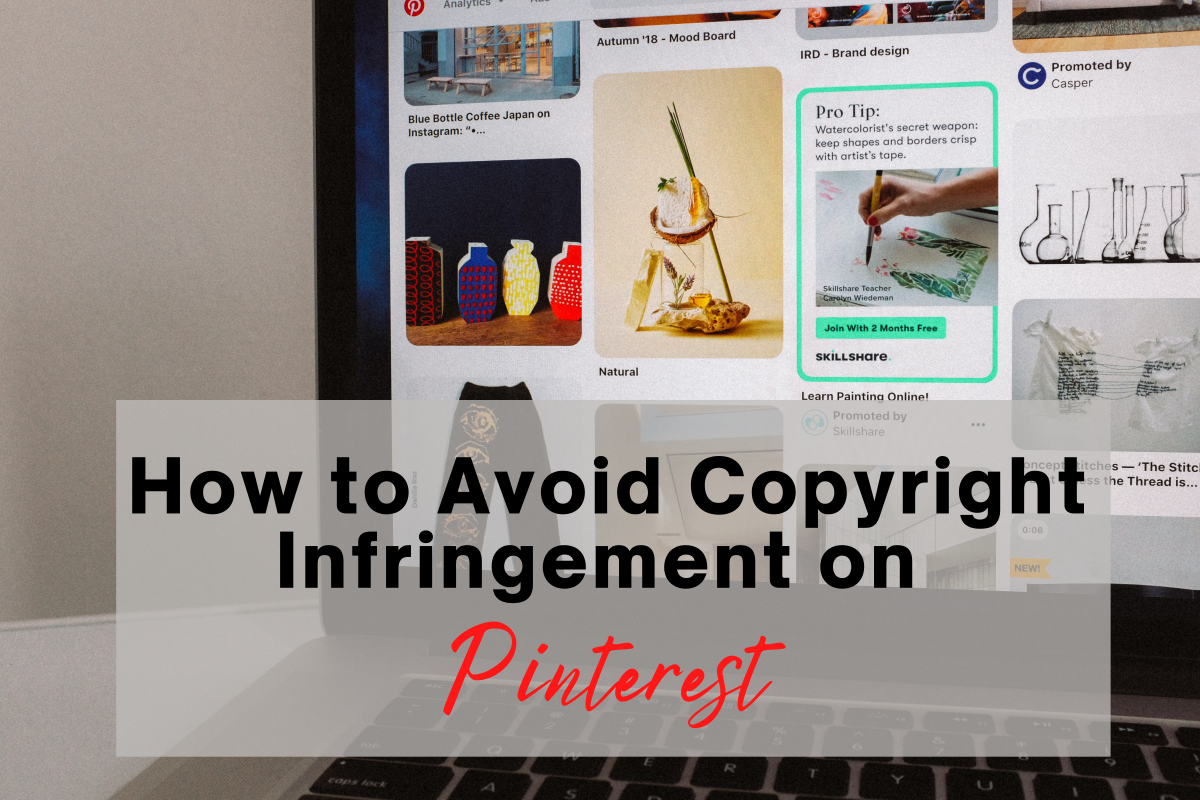Ways of Building Up Website Content Quickly
A Random Quote Text Widget on a Web Page
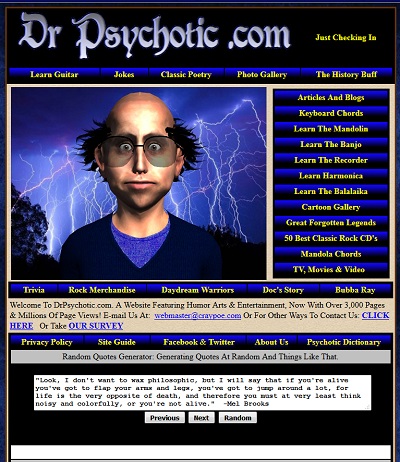
Introduction
First of all, content is king, just in case you haven't heard that particular saying yet. If you have no content on your website, then there is no reason for anyone to visit your website. What I mean mostly by using the word content is written content that people read. Articles and blogs fall into that category. Now, e-commerce sites generally don't have a lot of content other than what is being sold but some will have articles to help pull visitors in, in the hopes that they may decide to look over the merchandise since they are there already.
Other forms of content may include, images, videos, RSS feeds, various widgets, etc. However, having the various forms of content other than text is not advisable. After all, most of what is searched for in the search engines is text based, so you will always need some form of text-based content.
Text-based Content and Articles
Speaking of text-based content, how could you get articles up on your site quickly? Well, there are websites that make articles available for free. Usually these articles are written by people who want to draw attention to themselves or publicize themselves in some way. Many of those articles are written by professionals who work in the field related to their articles' subject matter. For example, a mechanic may write a number of articles about easy do-it-yourself car repairs.
All you need to do is run a search for free article websites or free content and you should be able to find plenty of websites with articles available having to do with the general subject matter that may pertain to the type of website you have or want to develop. There are articles available on really just about every subject imaginable.
The importance of having articles is that it gives visitors a reason to go to your site. After all, if your site has no content, how are you going to pull people in and what are they going to do once they get there? Also, what reason would they have to return to your website if they could see everything that you have on your site in one quick visit?
Now, there is a downside to using articles from those websites. That downside is the fact that search engines will penalize websites for having duplicate content. In other words, if you post an article from one of those sites, it will be duplicate content because others will have done the same thing. So, this should only be a temporary solution until you get a good amount of your own original content up on your site. it's really just a way of buying some time until you can do so.
Articles From Blogger.com in RSS Widgets
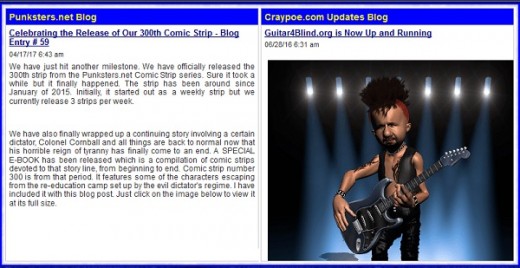
Images and Videos
Other things you could put up on your site are images and videos. There are plenty of public domain images that are free to use. Some of those websites that offer them only require that you credit them for the image that you use. Also, YouTube has embed code that you could put into your web pages to add videos to a page. So, if you want, you could add a video whose subject matter matches the subject matter of your website. You could even add your own commentary to the videos in order to elaborate further on the subject. Plus, the text yuou add to the page can improve search engine performance.
A great source for public domain images are government websites. the NASA website has some great images and some of the national parks' websites as well. Sites like those will often say that you may use their images but you can't use their logo because the use of their logo may imply to some that they are endorsing your site and they do not ever endorse anyone's site. That is just not their function.
Widgets and RSS Feeds
There are some widgets available that you could also put into the pages of your website. RSS feed widgets are great because you can include RSS feeds for articles related to the subject matter of your website. So many websites now have RSS feeds. RSS stands for Really Simple Syndication, by the way. News websites have RSS feeds as well. You could have the latest new headlines on your site. Even weather websites have widgets that you could put into your web pages. If you have a local website, you could include a widget that has the local weather.
Even social networking sites have some widgets available. You could have your Facebook feed on your website to incorporate elements of social networking into your site. Having them on your site can also increase your number of followers of your social networking accounts.
If you are a musician, you could include widgets from such websites as ReverbNation.com that will include the ability to play your music from a widget right on your website and allow the option of purchasing your music. A lot of other websites that you could use to sell merchandise will also provide code for widgets that will allow your visitors to purchase your merchandise right from your website.
A Widget for Selling Art Prints
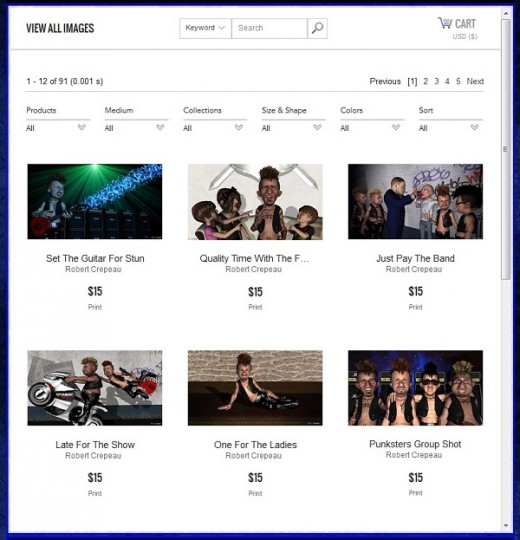
Beware of Copyright Issues
It is important to understand that each website that has either public domain images or articles available for you to post will most likely have some form of license agreement and using what they are making available to you may come with certain strings attached or may have limited uses. You need to understand what they are in order to avoid copyright infringement claims being made against you. Cease and desist orders could be a bit of a nuisance.
Some article sites may say that you can only use a certain number of articles from their site at a time. Some may limit you to ten. That means if you post eleven or more, you have violated their terms of agreement and could be held accountable for copyright infringement. So I can not stress enough the importance of reading the various license agreements on those sites. You can never be too safe when it comes to copyright infringement. Some people will actually contact your web hosting company and make a complaint about your site to them without even contacting you first. Then you will have to remove the content and inform your web hosting company once you have done so, just so that they can contact the people who made the complaint. Often, the people complaining will provide links to the pages they are complaining about and your web hosting company will pass that information on to you.
Media Usage Guidelines Page from the NASA Website
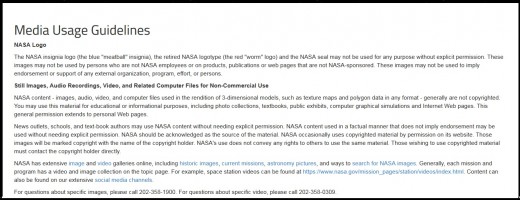
Remember, Much of This is a Temporary Solution
So now you have articles, images and videos on your site. Hey, that's great but remember what I said about having unique content. Those free articles and images are great for having something up that will give visitors something to look at. But eventually you will need your own original content in order to be able to pull in the search engine traffic.
The important thing about search engine traffic is the fact that it is free traffic and costs you nothing. Advertising, on the other hand can be quite costly. So you definitely want to bring in that free traffic first. Only original content will allow you to do so, since duplicate content gets penalized by the search engines.
This is why I only offer this as a temporary solution. You will eventually need your own original content. However, What I have suggested here can be a quick way of getting some content up on your site so that you will have something for your visitors to look at when they log on to your site. it’s just a way to buy you some time.
Conclusion
Again, I can not stress enough the importance of reading the terms of use for both article websites or the sites that offer public domain images. When it comes to copyright infringement, you can't be too safe. So check out what I have suggested. Run a quick search for public domain images as well as free website content, RSS feeds and widgets and you should be able to find something that you could use to get yourself started.
© 2017 Bob Craypoe


